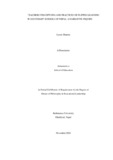
Please use this identifier to cite or link to this item:
https://hdl.handle.net/20.500.14301/511| Title: | Teachers' Perceptions and Practices of Flipped Learning in Secondary Schools of Nepal: A Narrative Inquiry |
| Authors: | Sharma, Laxmi |
| Citation: | Sharma, L.(2025). Teachers' perceptions and practices of flipped learning in secondary schools of Nepal: A narrative inquiry. |
| Issue Date: | Nov-2024 |
| Publisher: | Kathmandu University School of Education |
| School: | SOED |
| Department: | DOEL |
| Level: | M.Phil. |
| Program: | MPhil in Educational Leadership |
| Abstract: | This research investigates the perceptions and practices of secondary-level teachers regarding flipped learning, specifically focusing on how these educators narrate their experiences within this learning model. To achieve this, the study addresses how secondary-level teachers describe their perceptions and practices of flipped learning. The research draws on thick and rich descriptions by employing qualitative methods (Lincoln & Guba, 1985) to capture the teachers’ experiences in the Nepalese educational context. It aims to explore how flipped learning influences students’ motivation, performance, engagement, and learning outcomes. The study involved purposeful sampling of four secondary-level teachers from Pokhara and Kathmandu, who were recognized for their professionalism, innovation, and commitment to continuous learning. The researcher conducted multiple in-depth interviews, classroom observations, and post-observation interviews while reflecting on personal teaching experiences. The connectivism and social constructivism framework underpins the study, highlighting the importance of interaction and engagement in flipped learning environments. Findings reveal that teachers view flipped learning as effective as it enhances student engagement and fosters essential 21st-century skills, including creativity, communication, and collaboration. Teachers perceive that flipped classrooms engage students more and enhance their technological skills. Nevertheless, they face implementation challenges, such as addressing student capabilities, needing greater administrative and parental support, and managing time constraints. Teachers acknowledge that flipped learning promotes self-directed learning, allowing students to learn at their own pace. The research shows a transformation in teachers’ roles from traditional instructors to facilitators of learning. Though implementation remains challenging, educators express positivity and support for flipped learning, emphasizing their potential to foster multiple intelligences and enhance parental involvement in education. These insights could inform educational policy and contribute to the planning of innovative teaching practices. |
| URI: | https://hdl.handle.net/20.500.14301/511 |
| Appears in Collections: | Dissertation |
Files in This Item:
| File | Description | Size | Format | |
|---|---|---|---|---|
| MPhil Dissertation_Final_Laxmi binding.pdf | 1.89 MB | Adobe PDF |  View/Open |
Items in DSpace are protected by copyright, with all rights reserved, unless otherwise indicated.